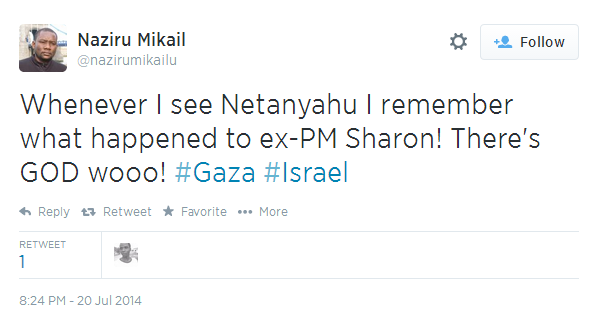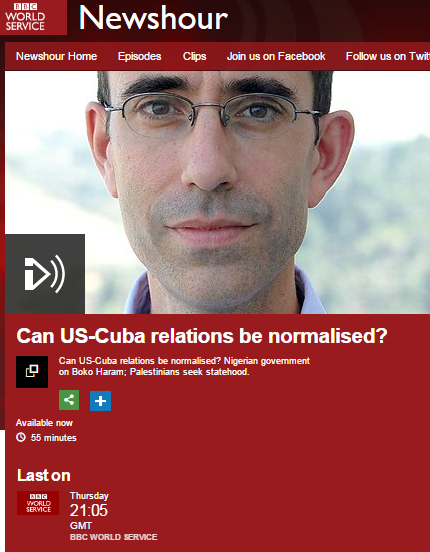On June 9th – the day after the terror attack at Sarona Market in which four people were murdered and 17 wounded – BBC Radio 4’s programme ‘The World Tonight’ broadcast an item apparently intended to convey to audiences that any future outbreak of violence between Israel and Hamas would be down to one prime factor.
As readers may be able to guess, that factor was not terrorism: the word did not appear even once throughout the report. Presenter Shaun Ley set the scene (from 18:13 here):
“Now, Israel’s newly appointed defence minister Avdor [sic] Lieberman has issued an order preventing the return of the bodies of any Palestinians who are killed in attacks there. The gunmen who shot dead four people and injured six [sic] others at a shopping centre in Tel Aviv last night were captured alive but this is a signal by Mr Lieberman – a political hardliner. In addition, permits for 83,000 Palestinians who were planning to come to Israel have been revoked and more troops are to be deployed in the occupied West Bank. Our reporter Andrew Hosken reports now from Jerusalem.”
Ley did not inform listeners that Lieberman’s order constitutes a return to previous policy or that the entry permits for Palestinians were frozen rather than “revoked”.
Hosken began his report with a description of Damascus Gate in Jerusalem, going on to say:
“But in recent months Damascus Gate has also been the scene of a string of knife attacks, mainly by young Palestinians of both sexes, on Jewish Israeli policemen and women.”
Over a dozen attacks have taken place at Damascus Gate since October of last year. Contrary to the claims from Hosken, the attacks were not directed exclusively at members of the security forces and many Israeli police and border police officers are not Jewish. At least four civilians were wounded in attacks at that location. Neither were all the attacks at Damascus Gate “knife attacks” as inaccurately claimed: at least five shooting attacks took place, including the one on February 3rd in which Border Police officer Hadar Cohen was murdered.
Hosken continued:
“The attacks here have earned this wave of assault that began last October the not terribly subtle title ‘the Intifada of knives’. But the latest assault involved machine guns and at the heart of Jewish Israel – Tel Aviv – some fifty miles or so west of Jerusalem. The Israeli government, led by the Right-wing Likud party, has promised a severe reaction against any Palestinian entity – individuals, organisations, even families – it considers culpable.”
Listeners then heard some general statements from MK Dr Anat Berko before Hosken went on:
“Raids were conducted today by Israeli security forces in Yatta – a small town which is home to at least two of the attackers. It’s in the Palestinian West Bank area where so many Israeli Jews have created settlements in defiance of a number of United Nations resolutions.”
There were two terrorists involved in the Sarona Market attack and both came from Yatta which is in Area A and under full Palestinian Authority control. There are of course no ‘settlements’ in Areas A or B.
Hosken next went to Kibbutz Alumim in the Western Negev.
“Jeremy Maisel [phonetic] lives on the Alumim kibbutz in south-west Israel just two and a half miles from the Gaza Strip – home to 2 million Palestinians.”
As of July 2015 the population of the Gaza Strip was 1.87 million.
“In the summer of 2014 during the conflict between Israel and Hamas – the Islamist organization that controls Gaza – the Alumim kibbutz came under rocket attack. No fewer than 282 code red alerts were issued to the people here, giving them 15 seconds to get to a bomb shelter. Jeremy Maisel remains pessimistic about any prospects of peace with the Palestinians.”
Maisel: “Hamas is a very extremist government there and they don’t hide their goals of destroying Israel, of killing Jews.”
Hosken continued:
“Most of the leaders of Hamas are based in Gaza and as far as the Israeli government is concerned, Hamas – which has often vowed to destroy Israel in the past – remains suspect number one when it comes to the attack in Tel Aviv.”
The Hamas movement in Yatta claimed that the two terrorists belonged to its organization soon after the attack.
Hosken then journeyed to Gaza.
“I’ve just crossed over from Israel into Gaza and the dysfunctionality of the place is clear on entry because after passing through Israeli passport control you have to negotiate two checkpoints on the Palestinians’ side operated by separate and differing organisations that have fought bitterly in the past for control of the Strip. The first is operated by Fatah and the second manned by Hamas.”
The checkpoint is actually Palestinian Authority – rather than “Fatah” – operated. Hosken then gave an inaccurate account of how the Gaza Strip came under Hamas control, completely erasing the terror organisation’s violent June 2007 coup from audience view.
“Hamas has controlled Gaza since winning elections here in 2006. Fatah controls the Palestinian Authority which holds sway on the West Bank – home to two of the Tel Aviv attackers.”
Listeners heard entirely unchallenged statements from three interviewees in Gaza, the first being “a prominent Fatah leader” whom Hosken asked about “the so-called Intifada of knives”.
“It is a reaction more than Intifada. It is a reaction from the people. The humiliation they face on the borders and cross points of the Israelis. They are using a very, very bad way in dealing with the Palestinians. They keep them for long time on the cross points, on the entrances and they don’t allow them to go to Jerusalem. They touch the feelings of the people so it is not an organized act. It is just a reactionary act.”
Hosken did not bother to clarify to listeners that Palestinians can in fact travel to Jerusalem with the appropriate paper work or that the security measures at crossings into Israel are the direct result of Palestinian terrorism.
Listeners also heard from a similarly unchallenged porter whom Hosken asked “what he thought about the attack in Tel Aviv”.
“I feel happy because they have taken Jerusalem, they have taken our land and it’s right to defend ourself. The operation is a natural because they took our land and look what they are doing in Gaza: they cut the electricity, they close the border.”
Hosken did not explain to listeners that the electricity cuts in the Gaza Strip have nothing at all to do with Israel and are the result of a dispute between Hamas and the PA. He went on:
“…but could there be another war soon? Even before Tel Aviv there was concern at the appointment as Israeli defence minister of Avigdor Lieberman – a hawk when it comes to the Palestinians and a man who has supported the assassination of Hamas leaders in the past.”
Listeners then heard from an associate professor of politics at Gaza’s Al Azhar University.
“The Palestinian elite in Gaza are a little bit concerned that maybe the bringing of Lieberman as defence minister might mean another war is in the making between Israel and Hamas within the next six months or a year. Lieberman in the past year or so since the Israeli elections have asked Netanyahu to reoccupy the Gaza Strip and have pushed Netanyahu to assassinate the political leadership of Hamas in the Gaza Strip so it could mean military activity against Hamas and the Palestinians in the Gaza strip in the foreseeable future.”
Hosken then closed with the following trite statement:
“Tonight for many people here, recent attempts by both France and Egypt to broker peace talks have never felt more forlorn.”
Hamas – along with several other Palestinian factions – clearly has no interest in peace talks, as one presumes Hosken himself knows, and has spent the last two years rebuilding its terrorist infrastructure. Nevertheless, listeners to this item were led to believe that the main factor threatening to lead to a renewal of conflict is the recent appointment of Avigdor Lieberman as Minister of Defence rather than Palestinian terrorism. Apparently that is what passes for ‘reporting’ at BBC Radio 4.




